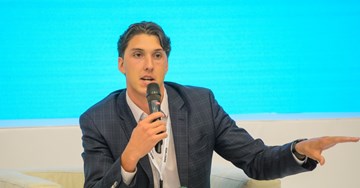Reconnecting with sustainability
Max Cherney, HBA ‘14, has been interested in sustainability since before his days at Ivey. During his first year at Ivey, he puzzled over how to connect his desire to make a sustainable impact from a place of mostly growth-oriented business classes that relied on some degree of extractive business practices.
However, at Ivey, Max discovered the Sustainability Certificate program, which gave him an outlet to apply business tools to sustainability problems and network with like-minded students who wanted to make an impact. To this day, he reminisces fondly on getting together with his peers and professors in the classroom and using classic business approaches to solve for not just profit, but also people and the planet.
After graduation, Max entered the advertising industry but yearned to somehow incorporate sustainability into his career. It took him a few years and an introduction to someone involved with a regenerative farm to find his path back to sustainability. Despite lacking an agricultural background, Max, who was already intrigued by the food system, found the Worldwide Opportunities on Organic Farms (WWOOF) initiative and began “wwoofing” on a 200+ acre farm. There, Max wondered if he could use his Ivey case-based learning experience and his marketing background to enhance the farm’s operations and bring it value. This inspired him to learn more about agricultural technology.
Supporting a niche purpose
This journey led Max to Nectar, a company supporting beekeeping operations, where he rose from a marketing role to his current role as Chief Operating Officer. In this capacity, Max actively implements the company’s vision rooted in sustainability, strategically planning and executing operations that support beekeepers and honeybees.
At Nectar, sustainability is ingrained into the company’s core key performance indicators. Nectar’s commitment extends beyond profits, incorporating metrics focused on impact, such as the survival rate of honeybees. Max plays a pivotal role in implementing standardized data collection and leveraging technology to improve beekeeper decision-making. This year, across North America, he estimates that around 49% of beehives died. As Nectar’s dataset and the power of machine learning and artificial intelligence grow, Max is more and more excited to positively assist beekeepers in making management decisions that decrease honeybee mortality.
Integrating sustainability into decision-making
Max hopes that sustainability will be woven into the decision-making processes of all companies in the future. In the future, he would prefer that sustainability didn’t need to live as a separate entity but instead should be at the core of any business decision. He advises students wanting to get into sustainability-based roles to get their hands dirty and gain experiences because that will open them up to plenty of opportunities.
“My hope is that as newer generations of business leaders and operators rise into impactful positions, we are able to design a new form of economy that takes stakeholder decision-making to heart.”
So, who are the stakeholders? “For us, it’s the beekeepers, the bees, the employees, the growers, the consumers, and the investors. Making sure that everyone’s opinions and values are being considered is going to be integral.”



